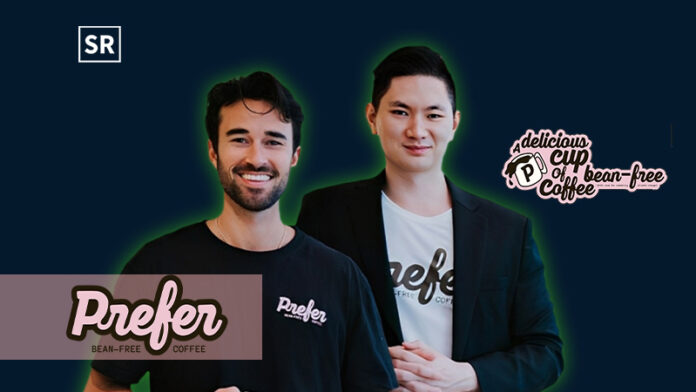
The Spark: Climate, Coffee & Curiosity
Jake Berber never set out to build a conventional coffee brand. As a neuroscience major turned venture investor, and later an MBA exchange student, he watched as coffee prices rose and climate change threatened coffee farming. Singapore Global Network writes that when he joined the NUS MBA exchange program from Tel Aviv, what was meant to be a few months turned into a permanent move when he co-founded Prefer.
One night, amid research and brainstorming, Jake and Ding Jie (Tan Ding Jie), his co-founder, asked: Why can’t coffee be made without beans? They saw an opportunity in precision fermentation and upcycled ingredients to make bean-free coffee — more sustainable, resilient to climate volatility, and potentially lower cost.
That question became Prefer. The name “Prefer” is derived from “precision fermentation”; a nod to their tech and mission.
Founders & Roles
- Jake Berber (CEO and Co-Founder) brings cross-domain experience in science, venture capital, and startup thinking, along with a passion for tackling climate challenges through food tech. His public profiles mention his pivot from neuroscience and VC into a sustainable beverage startup.
- Tan Ding Jie (CTO and Co-Founder) is known in Singapore’s food science and fermentation communities, having worked on flavor creation and fermentation before Prefer. The co-founders’ complementary skills—Jake on business, Ding Jie on technical fermentation & flavor—are cited in the media.
Together, they combine vision, science, and implementation in a domain (food + climate) that’s both technical and deeply human.
The Early Journey: From Idea to Launch
Much of the early development happened in stealth and lab work — prototyping fermentation processes, testing ingredient blends, mapping flavor profiles, and ensuring that the final product can be roasted, brewed, and tasted like traditional coffee.
During Jake’s NUS MBA exchange, he joined Entrepreneur First Singapore. That’s where he met Ding Jie. They formed Prefer early in that cohort.
They began experimenting: sourcing upcycled feedstocks such as day-old bread, soy pulp, and brewery-issued grain; fermenting them with microbes; roasting; grinding — and iterating endlessly. Prefer’s story mentions doing hundreds of prototypes before landing on viable formulations.
In February 2024, Prefer publicly announced that it had raised US$2 million in seed funding to scale its bioflavor production capabilities.
Read Also: Honest Bank: Building Transparent Finance to Empower Everyday Indonesians
The Product: Bean-Free Coffee via Fermentation
Prefer’s core technical differentiator lies in fermentation: turning abundant waste or by-products (bread, soy, grain) into compounds that mimic coffee flavor and aroma.
Their process involves: selecting feedstocks, blending, fermenting with food-grade microbes, roasting and grinding. Some versions are naturally caffeine-free; others are enriched. The final product is intended to brew like conventional coffee without requiring modifications to existing machines.
They have rolled out through cafes, bottled lattes, concentrates, and retail. They also aim to partner with general food & beverage companies and ingredient suppliers for scale.
Taste notes: their bean-free brew is described as nutty and chocolatey, with a coffee-like aroma; though they acknowledge it may not appeal to all palates initially.
Growth and Challenges
Prefer is at a very early stage. Some challenges and strategic directions include:
- Scaling production: transitioning from laboratory or small-batch production to commercial quantities without compromising flavor quality.
- Ingredient sourcing and reproducibility: availability of consistent supply chains for feedstocks and microbial strains.
- Market acceptance and taste: convincing consumers to taste a non-bean coffee and then persuading cafe operators to serve it.
- Regulation and food safety: all fermentation routes, microbial cultures, and processing are food-safe and comply with food safety standards in each jurisdiction.
- Fundraising & distribution: raising capital to scale, expanding into regional markets across Southeast Asia.
They are focusing first on Singapore and the Philippines.





